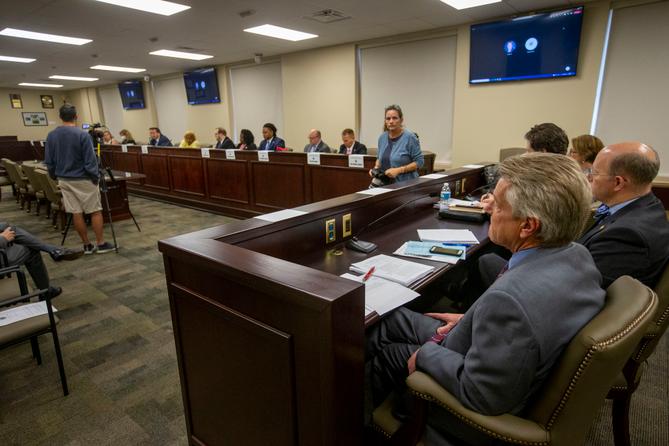Spotlight PA is an independent, nonpartisan newsroom powered by The Philadelphia Inquirer in partnership with PennLive/The Patriot-News, TribLIVE/Pittsburgh Tribune-Review, and WITF Public Media. Sign up for our free newsletters.
HARRISBURG — Republicans in the state House are advancing a proposal that would give Pennsylvania voters the opportunity to significantly change how elections are run here while bypassing Democratic Gov. Tom Wolf and his veto pen.
The House State Government Committee on Monday passed a proposed constitutional amendment that would require people voting in person or by mail to present “valid identification.” Exactly what constitutes valid ID would be laid out in separate legislation.
The proposal would also transfer the power to pick Pennsylvania’s top election official from the governor to the state’s voters and would ban counties from accepting outside money to help cover election costs. Paper ballots would need to have a watermark and be open to public inspection for at least two years.
The state auditor general would also be required to “audit” each election before the results are certified “to ensure we have accuracy,” Rep. Seth Grove (R., York), chair of the committee, said Monday.
The path to amending the state constitution is long, but has a major upside for Republicans: It does not require the approval of Wolf, who earlier this year vetoed a GOP-led election overhaul because of its voter ID requirements.
Grove, the author of the bill, at the time vowed to take “election reform directly to the people.” Wolf soon after said he was no longer opposed to changing the current ID rule, which only applies to first-time voters and those casting ballots at a new polling precinct.
The governor’s comments led Grove to reintroduce his legislation, which would also create early voting, institute new security rules for drop boxes, and allow voters to fix mail ballots with missing signatures. That measure passed the panel along party lines Monday.
Lyndsay Kensinger, a spokesperson for Wolf, said in a statement the “governor will veto any bill that suppresses the vote with unnecessary restrictions or undoes the landmark election reforms of Act 77″ — the bipartisan bill that expanded no-excuse mail voting in the state.
She did not respond to a follow-up question about whether Grove’s bill fit that definition.
As House lawmakers debate if and how to change Pennsylvania’s election laws, Republicans in the state Senate are attempting to gain access to personal information on all registered voters as part of a controversial review of last year’s presidential election.
The investigation is backed by supporters of former President Donald Trump, who spread baseless claims of widespread fraud in the state and falsely claimed the election was stolen from him.
Democrats on the House State Government Committee said the measures approved Monday are an extension of those “continued attacks.”
“Everybody sitting in here today won that election,” Rep. Scott Conklin, the ranking Democrat on the committee, said Monday. “I don’t hear anybody here saying, ‘You know what? I want to throw my election to the wind because I believe something wasn’t right.’”
State Republican lawmakers — many of whom sought to block Pennsylvania’s electors for President Joe Biden — have insisted the measures are necessary to improve election integrity.
The state Senate is pursuing its own version of a constitutional amendment to require voter ID, as well as a bipartisan bill that would fix many of the issues county election officials have repeatedly raised.
By simultaneously pursuing legislative changes as well as constitutional amendments, the GOP is presenting Wolf with a dilemma: agree to a bill or be cut out of the conversation completely.
To send a question about amending the Pennsylvania Constitution to the voters, lawmakers in both the House and Senate must approve identical proposals in two consecutive legislative sessions. The earliest the election overhaul amendment could appear on a ballot is 2023.
Constitutional amendments — which can be put on the ballot during primary or general elections — rarely fail to pass in Pennsylvania. Since the 1990s, voters have approved 100% of ballot questions.
Frustrated by Wolf’s handling of the pandemic, Pennsylvania Republicans turned to the process to send two questions about curtailing the governor’s power to the voters. Those proposals were approved this spring, and GOP leadership quickly used them to end the state’s coronavirus disaster declaration.
WHILE YOU’RE HERE… If you learned something from this story, pay it forward and become a member of Spotlight PA so someone else can in the future at spotlightpa.org/donate. Spotlight PA is funded by foundations and readers like you who are committed to accountability journalism that gets results.
